剑桥语法现在进行时
- 格式:pptx
- 大小:1.59 MB
- 文档页数:30
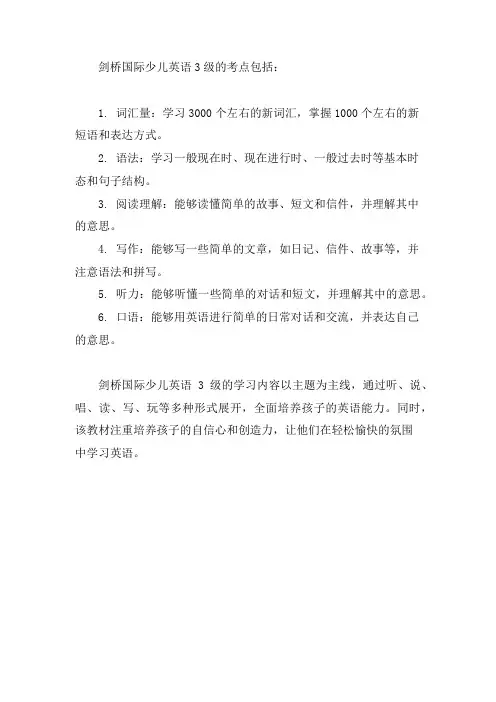
剑桥国际少儿英语3级的考点包括:
1. 词汇量:学习3000个左右的新词汇,掌握1000个左右的新
短语和表达方式。
2. 语法:学习一般现在时、现在进行时、一般过去时等基本时
态和句子结构。
3. 阅读理解:能够读懂简单的故事、短文和信件,并理解其中
的意思。
4. 写作:能够写一些简单的文章,如日记、信件、故事等,并
注意语法和拼写。
5. 听力:能够听懂一些简单的对话和短文,并理解其中的意思。
6. 口语:能够用英语进行简单的日常对话和交流,并表达自己
的意思。
剑桥国际少儿英语3级的学习内容以主题为主线,通过听、说、唱、读、写、玩等多种形式展开,全面培养孩子的英语能力。
同时,该教材注重培养孩子的自信心和创造力,让他们在轻松愉快的氛围
中学习英语。
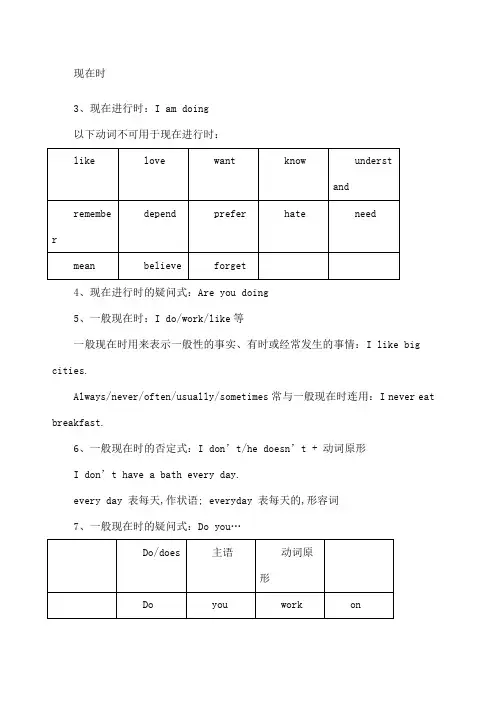
现在时3、现在进行时:I am doing 以下动词不可用于现在进行时:4、现在进行时的疑问式:Are you doing5、一般现在时:I do/work/like 等一般现在时用来表示一般性的事实、有时或经常发生的事情:I like big cities.Always/never/often/usually/sometimes 常与一般现在时连用:I never eat breakfast.6、一般现在时的否定式:I don ’t /he doesn’t + 动词原形 I don ’t have a bath every day.every day 表每天,作状语; everyday 表每天的,形容词 7、一般现在时的疑问式:D o you…What do you do 表示“你是做什么工作的”8、have/have got12have 表“吃、喝、拿”时,不能用have got代替3下列短语中,要用have15、现在完成时1have done2just/already/yetJust表“刚才”:we’ve just arrived.Already表“已经”在预料之前:they’ve already arrived. =before you expectedYet表“直到现在”用于否定句和疑问句中:they haven’t arrived yet.3现在完成时与ever用于疑问句中/never连用:Have you ever played golf 4gone表“去而未归”:she has gone to China.Been表“去而已归”:he has been to China.5H ow long have you…She has been in Ireland since Monday/for three days.25、what are you doing tomorrowI am doing something tomorrow 表示“我已经安排好明天要做某事/我计划明天做某事”I am going to do something.同上be going to 与 will 的区别注意:用一般现在时表示时间表、节目单、火车与公共汽车时刻表等:The train arrives at .27、will/shall1 I shall =I will、we shall=we will :I shall be late tomorrow. = I will be late tomorrow.在构成将来时的时候,不可将shall与you/they/it/he/she等非第一人称连用:Tom will be late. 而不能 Tom shall be late.2I’ll …表“提议或决定做某事”:I’ll phone you tomorrow.I think I’ll/I don’t think I’ll…表“决定做某事”:I think I’ll go to bed early tonight.3Shall I…/Shall we…表“你认为…好吗”28、might=may29、can/could:could为过去式30、must/mustn’t/don’t need to1表示过去时,用had to而不用must:We had to walk home last night.2don’t need to = don’t have to31、should1I think…should/I don’t think….should/do you think…should2ought to =should32、I have to1表过去时,用had to2表示认为有必要做某事或提出个人看法时,must或have to都可以不是表个人看法时,只能用have to:Eg: You can’t park your car here for nothing. You have to pay. 非个人看法I t’s a fantastic film. You must see it./You have to see it.33、I used to/I didn’t used to/did you use to…38、there has been/there have been41、反义疑问句Have you/are you/don’t you 表“对某事感兴趣或感到惊奇”:——I’ve bought a new car.——Oh, have you记住:前否后肯,前肯后否It’s a nice day, isn’t itThat isn’t your car, is it42、too/either so am I/neither do I12both+复数名词either/neither单数名词,谓语动词用单数44、疑问句1is it…/have you…/do they…why isn’t…/why don’t…2who saw you/who did you see3以特殊疑问词开头的句子,介词位于句尾:where are you from4what’s it like/what are they like 表询问某事物的情况——新旧、好坏、大小等5疑问词52、不定式与-ing形式动词+不定式动词+-ing动词+-ing或不定式55、56、57、do 与 make66、名词在英语中,下列词语以复数出现:以下名词通常不可数73、the的用法77、not + any/no/more 1not + any=no….=not a2no …通常用于havegot 与there is/are 之后 3动词否定形式+any =动词肯定形式+no 4no 之后接名词、none 可单独使用 None 表示“无”;no-one 表示“没人 80、every/all1every +单数名词,谓语动词用单数 2everywhere 是副词83、a lot/ much/many/alittle/afew1a lot of + 可数/不可数,也可不跟名词2much+不可数,用于否定句与疑问句,也可不跟名词3many+复数488、a bit older/ much olderA bit older than….A bit more difficult than…Much better than…Much more expensive than… 89、not as …as Not as much as…. Not as many as… The same as….90、the oldest/ the most expensive可用最高级+I ’ve ever…./ you’ve ever….等:The film was very bad. I think it’s the worst film I’ve ever seen. What is the most unusual thi ng you’ve ever done 91、enough/too93、词序1地点状语位于时间状语之前:we went to a party last night. 2always/never/often 等词用于动词之前,be 动词之后,两个动词之间: . I always drink coffeein the morning.I am always tired.I will always remember you. / I can never find my keys.96、give/ lend/pass/send/show/buy/getgive sth to sbgive sb sth注意:当某物为代词it或them时,用第一种结构比较好:I gave it to my father.98、when1当以when开头时,两部分用逗号隔开:When I went out, it was raining.2一般现在时用于when之后表示将来:Lisa will be in Mexico when Sarah is in New York.When I get home this evening, I’m going to have a shower.3before/while/after/until的用法类似:Please close the window before you go out.I’ll wait here until you come back.99、if1if之后常用一般现在时:If you see Ann tomorrow, can you ask her to call meWhat shall we do if it rains2if I/you/he/she/they/it had……I/you/he would….if I/it/he/she was…或if I/it/he/she were….这里的动词都是过去式在这种句子里,句意表示事实上这个假设不成立:If I had the money, I would buy a fast car.事实上我没有钱买车; I wou ldn’t go out if I were you.事实上我不是你; 3比较103、at/on/in 12固定搭配106、in/at/on 12112、动词短语123get in a carget on the busgo awayran away/run offdrive away/drive offturn over and look at the next page。
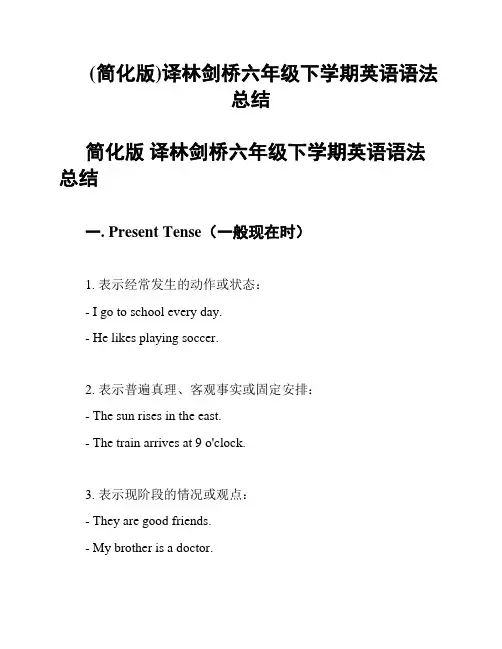
(简化版)译林剑桥六年级下学期英语语法总结简化版译林剑桥六年级下学期英语语法总结一. Present Tense(一般现在时)1. 表示经常发生的动作或状态:- I go to school every day.- He likes playing soccer.2. 表示普遍真理、客观事实或固定安排:- The sun rises in the east.- The train arrives at 9 o'clock.3. 表示现阶段的情况或观点:- They are good friends.- My brother is a doctor.二. Past Tense(一般过去时)1. 表示过去发生的动作或状态:- We watched a movie yesterday.- She lived in London when she was young.2. 表示过去的惯或经常发生的动作:- We used to visit our grandparents every summer. - He always played piano after school.三. Future Tense(一般将来时)1. 表示将会发生的动作或情况:- I will go shopping tomorrow.- They will have a test next week.2. 表示计划、意图或预测:- She is going to travel to Europe next month.- It might rain tonight.四. Present Continuous Tense(现在进行时)1. 表示现阶段正在进行的动作:- We are studying English now.- They are playing basketball.2. 表示接近未来计划或正在发生但不一定是现阶段的动作:- I am leaving for vacation tomorrow.- He is always talking too much.五. Past Continuous Tense(过去进行时)1. 表示过去某个时间段内正在进行的动作:- They were watching TV when I called.- He was playing games all night yesterday.2. 表示过去某个时间点正在进行的动作被干扰:- She was cooking when the phone rang.- I was writing an email when the power went out.以上是本文的简化版译林剑桥六年级下学期英语语法总结,希望对你有帮助!。
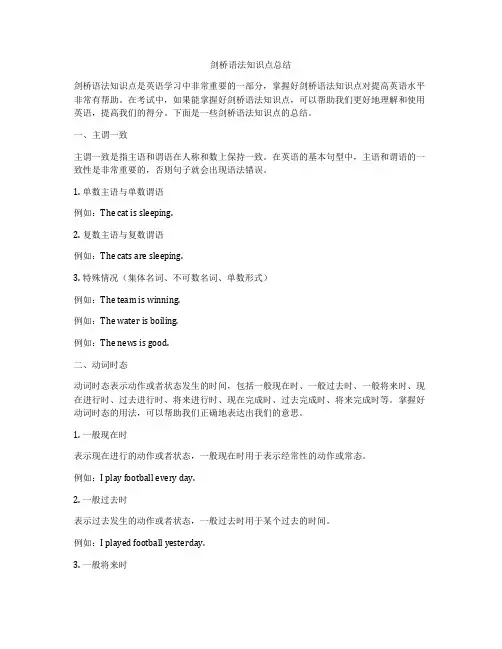
剑桥语法知识点总结剑桥语法知识点是英语学习中非常重要的一部分,掌握好剑桥语法知识点对提高英语水平非常有帮助。
在考试中,如果能掌握好剑桥语法知识点,可以帮助我们更好地理解和使用英语,提高我们的得分。
下面是一些剑桥语法知识点的总结。
一、主谓一致主谓一致是指主语和谓语在人称和数上保持一致。
在英语的基本句型中,主语和谓语的一致性是非常重要的,否则句子就会出现语法错误。
1. 单数主语与单数谓语例如:The cat is sleeping.2. 复数主语与复数谓语例如:The cats are sleeping.3. 特殊情况(集体名词、不可数名词、单数形式)例如:The team is winning.例如:The water is boiling.例如:The news is good.二、动词时态动词时态表示动作或者状态发生的时间,包括一般现在时、一般过去时、一般将来时、现在进行时、过去进行时、将来进行时、现在完成时、过去完成时、将来完成时等。
掌握好动词时态的用法,可以帮助我们正确地表达出我们的意思。
1. 一般现在时表示现在进行的动作或者状态,一般现在时用于表示经常性的动作或常态。
例如:I play football every day.2. 一般过去时表示过去发生的动作或者状态,一般过去时用于某个过去的时间。
例如:I played football yesterday.3. 一般将来时表示将来要发生的动作或者状态,一般将来时用于表示将来的某个时间。
例如:I will play football tomorrow.4. 现在进行时表示现在正在进行的动作,现在进行时用于表示现在正在进行的动作。
例如:I am playing football now.5. 过去进行时表示过去正在进行的动作,过去进行时用于表示过去某个时间正在进行的动作。
例如:I was playing football when it started raining.6. 将来进行时表示将来某个时间正在进行的动作,将来进行时用于表示将来某个时间正在进行的动作。
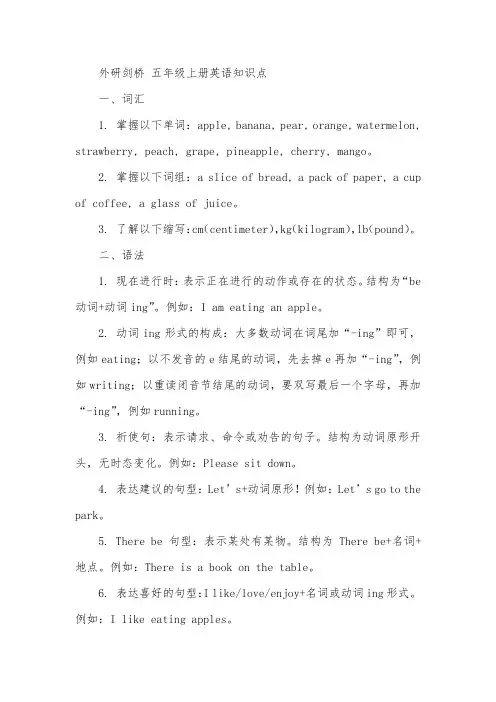
外研剑桥五年级上册英语知识点一、词汇1. 掌握以下单词:apple, banana, pear, orange, watermelon, strawberry, peach, grape, pineapple, cherry, mango。
2. 掌握以下词组:a slice of bread, a pack of paper, a cup of coffee, a glass of juice。
3. 了解以下缩写:cm(centimeter),kg(kilogram),lb(pound)。
二、语法1. 现在进行时:表示正在进行的动作或存在的状态。
结构为“be 动词+动词ing”。
例如:I am eating an apple。
2. 动词ing形式的构成:大多数动词在词尾加“-ing”即可,例如eating;以不发音的e结尾的动词,先去掉e再加“-ing”,例如writing;以重读闭音节结尾的动词,要双写最后一个字母,再加“-ing”,例如running。
3. 祈使句:表示请求、命令或劝告的句子。
结构为动词原形开头,无时态变化。
例如:Please sit down。
4. 表达建议的句型:Let’s+动词原形!例如:Let’s go to the park。
5. There be句型:表示某处有某物。
结构为There be+名词+地点。
例如:There is a book on the table。
6. 表达喜好的句型:I like/love/enjoy+名词或动词ing形式。
例如:I like eating apples。
7. 表达意愿的句型:I want to+动词原形。
例如:I want to go to the zoo。
8. 表达请求的句型:Can I+动词原形?例如:Can I have a piece of bread?9. 表达感谢的句型:Thank you for+名词或动词ing形式。
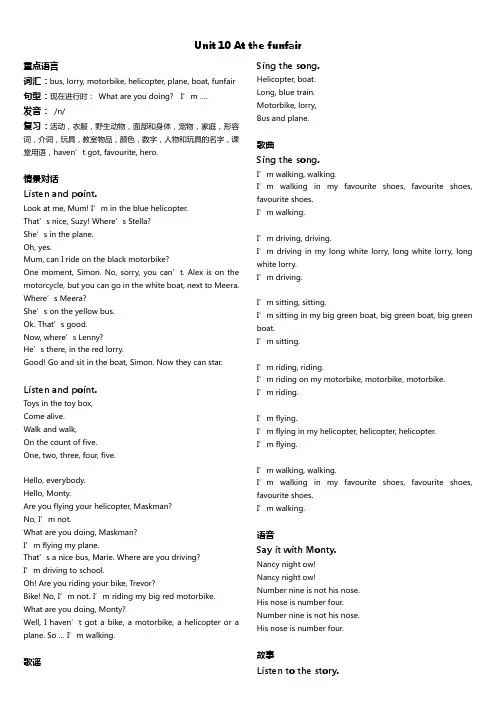
Unit 10 At the funfair重点语言词汇:bus, lorry, motorbike, helicopter, plane, boat, funfair 句型:现在进行时:What are you doing? I’m ….发音:/n/复习:活动,衣服,野生动物,面部和身体,宠物,家庭,形容词,介词,玩具,教室物品,颜色,数字,人物和玩具的名字,课堂用语,haven’t got, favourite, hero.情景对话Listen and point.Look at me, Mum! I’m in the blue helicopter.That’s nice, Suzy! Where’s Stella?She’s in the plane.Oh, yes.Mum, can I ride on the black motorbike?One moment, Simon. No, sorry, you can’t. Alex is on the motorcycle, but you can go in the white boat, next to Meera. Where’s Meera?She’s on the yellow bus.Ok. That’s good.Now, where’s Lenny?He’s there, in the red lorry.Good! Go and sit in the boat, Simon. Now they can star.Listen and point.Toys in the toy box,Come alive.Walk and walk,On the count of five.One, two, three, four, five.Hello, everybody.Hello, Monty.Are you flying your helicopter, Maskman?No, I’m not.What are you doing, Maskman?I’m flying my plane.That’s a nice bus, Marie. Where are you driving?I’m driving to school.Oh! Are you riding your bike, Trevor?Bike! No, I’m not. I’m riding my big red motorbike. What are you doing, Monty?Well, I haven’t got a bike, a motorbike, a helicopter or a plane. So … I’m walking.歌谣Sing the song.Helicopter, boat.Long, blue train.Motorbike, lorry,Bus and plane.歌曲Sing the song.I’m walking, walking.I’m walking in my favourite shoes, favourite shoes, favourite shoes.I’m walking.I’m driving, driving.I’m driving in my long white lorry, long white lorry, long white lorry.I’m driving.I’m sitting, sitting.I’m sitting in my big green boat, big green boat, big green boat.I’m sitting.I’m riding, riding.I’m riding on my motorbike, motorbike, motorbike.I’m riding.I’m flying.I’m flying in my helicopter, helicopter, helicopter.I’m flying.I’m walking, walking.I’m walking in my favourite shoes, favourite shoes, favourite shoes.I’m walking.语音Say it with Monty.Nancy night ow!Nancy night ow!Number nine is not his nose.His nose is number four.Number nine is not his nose.His nose is number four.故事Listen to the story.Toys in the toy box,Come alive.Walk and walk,On the count of five.One, two, three, four, five.Help! Help! I can’t swim.I’m flying my helicopter. Look! I can see a boy.Oh! He can’t swim.I can pick the boy up.Stand next to me, Sam. You can fly in my helicopter again. Thanks, Maskman. Wow! You’re my hero!Maskman … a green lorry! Stop! You can’t cross the street now. look, the man’s red!Ooh! Er! Thank you, M onty. Wow! You’re my hero. That’s ok, Maskman.Do the Monty song.Do the Monty song.Let’s all do the Monty song.。
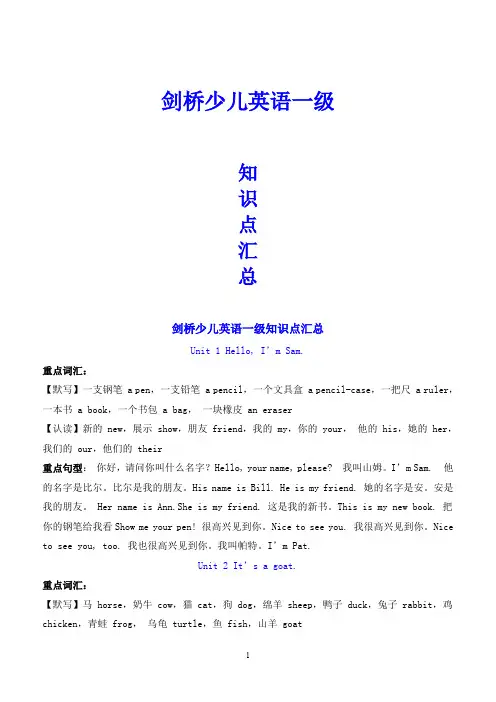
剑桥少儿英语一级知识点汇总剑桥少儿英语一级知识点汇总Unit 1 Hello, I’m Sam.重点词汇:【默写】一支钢笔 a pen,一支铅笔 a pencil,一个文具盒 a pencil-case,一把尺 a ruler,一本书 a book,一个书包 a bag,一块橡皮 an eraser【认读】新的 new,展示 show,朋友 friend,我的 my,你的 your,他的 his,她的 her,我们的 our,他们的 their重点句型:你好,请问你叫什么名字?Hello, your name, please? 我叫山姆。
I’m Sam. 他的名字是比尔。
比尔是我的朋友。
His name is Bill. He is my friend. 她的名字是安。
安是我的朋友。
Her name is Ann.She is my friend. 这是我的新书。
This is my new book. 把你的钢笔给我看Show me your pen! 很高兴见到你。
Nice to see you. 我很高兴见到你。
Nice to see you, too. 我也很高兴见到你。
我叫帕特。
I’m Pat.Unit 2 It’s a goat.重点词汇:【默写】马 horse,奶牛 cow,猫 cat,狗 dog,绵羊 sheep,鸭子 duck,兔子 rabbit,鸡chicken,青蛙 frog,乌龟 turtle,鱼 fish,山羊 goat【认读】长的 long,尾巴 tail,微笑 smile,大象 elephant,蜥蜴 lizard 重点句型:这是什么?What’s this? 这是我的猫。
This is my cat. 让我来试试。
Let me try. 它是一只山羊。
It’s a goat. 我喜爱它。
I love it.Unit 3 I like apples.重点词汇:【默写】苹果 apple-apples, pear-pears,梨香蕉 banana-bananas,菠萝pineapple-pineapples,桔子 orange-oranges ,西瓜 watermelon-watermelons ,椰子coconut-coconuts,柚子 grapefruit-grapefruits,葡萄 grape-grapes,芒果mango-mangoes,柠檬 lemon -lemons,桃子 peach-peaches,【认读】喜欢 like,想要 would like/want,一些 some,特别喜爱的 favourite,水果 fruit 重点句型:你想要什么?What would you like? 我想要一些苹果。
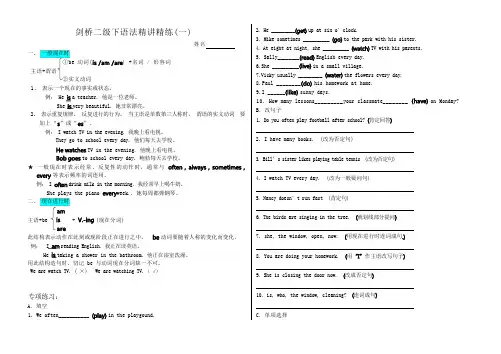
剑桥二级下语法精讲精练(一)姓名一、一般现在时①be 动词名词 / 形容词主语+谓语②实义动词1、表示一个现在的事实或状态。
例: He a teacher. 他是一位老师。
She very beautiful. 她非常漂亮。
2、表示重复规律、反复进行的行为。
当主语是单数第三人称时,谓语的实义动词要”或“例: I watch TV in the evening. 我晚上看电视。
They go to school every day. 他们每天去学校。
TV in the evening. 他晚上看电视。
to school every day. 鲍勃每天去学校。
★一般现在时表示经常、反复性的动作时,通常与等表示频率的词连用。
例: I drink milk in the morning. 我经常早上喝牛奶。
week.. 她每周都弹钢琴。
二、现在进行时主语+ (现在分词)此结构表示动作在此刻或现阶段正在进行之中,动词要随着人称的变化而变化。
例: I reading English. 我正在读英语。
taking a shower in the bathroom. 他正在浴室洗澡。
用此结构造句时,切记 be 与动词现在分词缺一不可。
We are watch TV. ( ×) We are watching TV. ( √)专项练习:A.填空in the playgound.up at six o’clock.to the park with his sister.4. At eight at night, she __________ TV with his parents.English every day.6.She __________in a small village.7.Vicky usually _________ the flowers every day.his homework at home.sunny days.on Monday? B.改句子1. Do you often play football after school? 肯定回答2. I have many books. (改为否定句)3. Bill’s sister likes playing table te nnis (改为否定句)4. I watch TV every day. (改为一般疑问句)5. Nancy doesn’t run fast (肯定句)6. The birds are singing in the tree. 就划线部分提问7. she, the window, open, now. 用现在进行时连词成句8. You are doing your homework. 用作主语改写句子9. She is closing the door now. 改成否定句10. is, who, the window, cleaning? 连词成句C.单项选择( )1. ______ are the birds doing? They are singing in a tree.(A)Who (B)What (C)How (D)Where( )2. Is she ______ something?(A)eat (B)eating (C)eatting (D)eats( )3. 你在干什么?(A) What is you doing? (B)What are you do?(B) What are you doing? (D)What do you do?( )4. 我正在听他说话.(A)I listening to him. (B)I'm listening to him.(C)I'm listen to him. (D)I'm listening him.( )5. Listen! She ______ in the classroom.(A)is singing (B)sing (C)to sing (D)is sing( )6. ______ are you eating? I'm eating ______ meat.(A)What, some (B)Which, any (C)Where, not (D)What, a( )7. They______TV in the evening. They do their homework.(A)are watching (B)can't watching (C)don't watch (D)don't watching ( )8. The children ______ football.(A)is playing (B)are playing (C)play the (D)play a( )9. They are flying kites.(A)他们喜欢放风筝. (B)他们在放风筝吗? (C)他们在放风筝. (D)他们常放风筝. ( )10.Look. Lucy is _____ a new bike today.(A)jumping (B)running (C)riding (D)takeingD.用一般现在时或现在进行时填空。
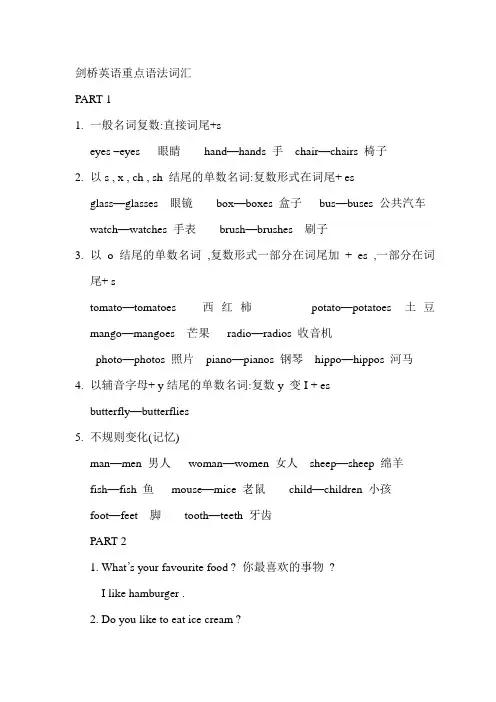
剑桥英语重点语法词汇PART 11.一般名词复数:直接词尾+seyes –eyes 眼睛hand—hands 手chair—chairs 椅子2.以s , x , ch , sh 结尾的单数名词:复数形式在词尾+ esglass—glasses 眼镜box—boxes 盒子bus—buses 公共汽车watch—watches 手表brush—brushes 刷子3.以o 结尾的单数名词,复数形式一部分在词尾加+ es ,一部分在词尾+ stomato—tomatoes 西红柿potato—potatoes 土豆mango—mangoes 芒果radio—radios 收音机photo—photos 照片piano—pianos 钢琴hippo—hippos 河马4.以辅音字母+ y结尾的单数名词:复数y 变I + esbutterfly—butterflies5.不规则变化(记忆)man—men 男人woman—women 女人sheep—sheep 绵羊fish—fish 鱼mouse—mice 老鼠child—children 小孩foot—feet 脚tooth—teeth 牙齿PART 21. What’s your favourite food ? 你最喜欢的事物?I like hamburger .2. Do you like to eat ice cream ?Do you like eating ice cream ? 你喜欢….吗?Yes , I do ./ No , I don’t .3. What’s your favourite fruit ?(最喜欢的水果)I like watermelon./ My favourite fruit is watermelon .4. What fruit do you like best ?I like apples best .5. What colour is your bike ? It’s yellow .Is it red ? Yes, it is ./No , it isn’t .What colour are your eyes/shoes ? They are black .Are they blue ? Yes , they are ./No , they aren’t .6. Colour the …把…涂成…颜色Colour the hat on the desk red .Colour the hat on the wall next to the door purple .PART 3There be 句型: 表达在某处有某物There is a/an + 人或物+在某处e.g. There is an elephant in the zoo .( 肯定句)There isn’t an elephant in the zoo . (否定句)Is there an elephant in the zoo ? (一般疑问句)Yes, there is . / No , there isn’t .How many elephants are there in the zoo ?There are +数量+人或物的复数+在某处e.g. There are some birds in the tree .( 肯定句)There aren’t any birds in the tree . ( 否定句)Are there any birds in the tree ? ( 一般疑问句)Yes , there are . No , there aren’t .How many birds are there in the tree ?重点操练句型Where is the book ? It’s on /under the desk .Put …on /in /next/in front of/between /behindWhat’s your favourite animal ?Do you like monkeys ?How many students are there in your class ?There are ..What’s your phone number ?My phone number is …How old are you ? I am …PART4现在进行时现在分词形式一般直接在动词原形后+ ing.辅因字母加e 结尾,去e + ing。
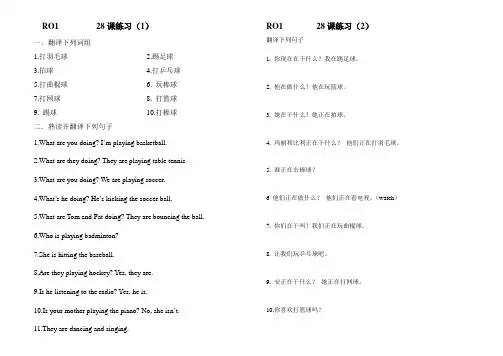
RO1 28课练习(1)一.翻译下列词组1.打羽毛球2.踢足球3.拍球4.打乒乓球5.打曲棍球6. 玩棒球7.打网球8. 打篮球9. 踢球10.打棒球二.熟读并翻译下列句子1.What are you doing? I’m playing basketball.2.What are they doing? They are playing table tennis3.What are you doing? We are playing soccer.4.What’s he doing? He’s kicking the soccer ball.5.What are Tom and Pat doing? They are bouncing the ball.6.Who is playing badminton?7.She is hitting the baseball.8.Are they playing hockey? Yes, they are.9.Is he listening to the radio? Yes, he is.10.Is your mother playing the piano? No, she isn’t.11.They are dancing and singing. RO1 28课练习(2)翻译下列句子1. 你现在在干什么?我在踢足球。
2. 他在做什么?他在玩篮球。
3. 她在干什么?她正在拍球。
4. 玛丽和比利正在干什么?他们正在打羽毛球。
5. 谁正在击棒球?6 他们正在做什么?他们正在看电视。
(watch)7. 你们在干吗?我们正在玩曲棍球。
8. 让我们玩乒乓球吧。
9. 安正在干什么?她正在打网球。
10.你喜欢打篮球吗?RO1 30课(1) 1.他们正在游泳。
2我们正在和那条狗在海滩上玩耍。
3.那个男孩正在学校跑步。
4.那个老人在家睡觉。
5.这个年轻女人正在公园里钓鱼。
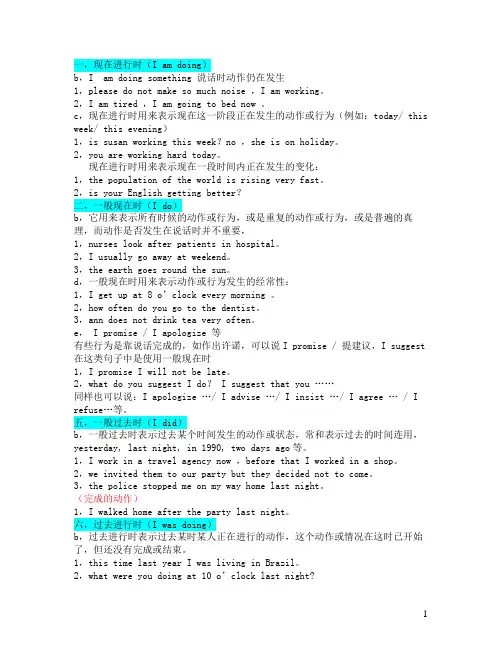
一,现在进行时(I am doing)b,I am doing something 说话时动作仍在发生1,please do not make so much noise ,I am working。
2,I am tired ,I am going to bed now 。
c,现在进行时用来表示现在这一阶段正在发生的动作或行为(例如:today/ this week/ this evening)1,is susan working this week?no ,she is on holiday。
2,you are working hard today。
现在进行时用来表示现在一段时间内正在发生的变化:1,the population of the world is rising very fast。
2,is your English getting better?二,一般现在时(I do)b,它用来表示所有时候的动作或行为,或是重复的动作或行为,或是普遍的真理,而动作是否发生在说话时并不重要,1,nurses look after patients in hospital。
2,I usually go away at weekend。
3,the earth goes round the sun。
d,一般现在时用来表示动作或行为发生的经常性:1,I get up at 8 o’clock every morning 。
2,how often do you go to the dentist。
3,ann does not drink tea very often。
e, I promise / I apologize 等有些行为是靠说话完成的,如作出许诺,可以说I promise / 提建议,I suggest 在这类句子中是使用一般现在时1,I promise I will not be late。
2,what do you suggest I do? I suggest that you ……同样也可以说:I apologize …/ I advise …/ I insist …/ I agree … / I refuse…等。
剑桥少儿英语的一级英语语法“剑桥少儿英语”是英国剑桥大学考试委员会专门为英语为非母语国家的少年儿童设计的学习系统。
目前,几百万适龄儿童在全世界50多个国家和地区进行学习。
下面是无忧考网整理的剑桥少儿英语的一级英语语法,希望对你们有帮助。
1、人称代词与be动词:1)人称代词--表示“我、你、他、我们、你们、他们等”的词叫做人称代词,用来代替人或物。
2)Be动词:am, is ,are 他们的意思相同,表示“是”3)人称代词与be动词的搭配:I---am, he----is, we---areshe---is they---areit ----- is you---are另外,is还用于一个人或者一个事物的后面,如Jim是6岁。
这时,Jim是一个人,Jim后面的是字就要用单词is来表示。
this,that 的后面也要用is .are用在多个人或物的后面,如Tom和Ann是五岁。
这时,Tom和Ann是两个人,后面的是字就要用单词are来表示。
am只用在我(I)的后面。
4)人称代词和be动词的缩写:I'm, he's, she's, it's, we're, they're, you're2、指示代词:表示这个那个,这些那些的词叫做指示代词。
指示代词有:这个this,那个that,这些these,那些those指示代词与be动词的搭配:this--is;that--is ;these--are;those-- are。
3、名词及名词的复数1)一般情况加–s,清辅音后读/s/ 浊辅音和元音后读/z/:girl-girls pen-pens bag-bags car-cars2)以s, sh, ch, x结尾加–es, 读/iz/ bus-buses watch-watches box-boxes brush-brushes3)结尾,变y 为i再加es, 读/z/ baby---babies但元音字母+y 结尾的名词变复数时,直接加s变复数。
动词ing动词ing的变化规则1. 一般情况下直接在动词后加ingplay-----playing read-----reading2. 动词是以辅元辅结构结尾的重读闭音节,双写最后一个字母,再加ingswim-----swimming run------running3. 动词以不发音的e结尾的,去掉e,再加ingride-----riding write------writing练习:watch----- drink----- hold-----eat----- water----- tidy-----feed----- mop----- clean-----make----- wash----- fish-----blow----- go----- do-----jump----- catch----- hop-----sit----- kick----- listen-----paint----- fly----- draw-----现在进行时现在进行时的定义:现在进行时表达现在或当前一般时间正在进行的动作。
现在进行时的构成是: be(am/is/are)+动词ing (be为助动词,应与主语的人称和数保持一致,同学们最容易漏掉)1. I am swimming. 我正在游泳2. She is eating cakes. 她正在吃蛋糕3. We are playing football. 我们正在打篮球注意:问句用doing提问,答句用动词ing回答。
如:What's the boy doing? watering the flowers.(浇花)翻译:1.The boy is playing basketball.2.They are singing in the classroom.3.I‘m reading a book.4.What's the man holding?5.What's the children playing?6.Who is the girl talking with?7.Where is the boy swimming?8.How many birds are singing?9.What's he drawing?10.Is Tom playing the guitar?介词剑桥一级重要考察方位介词的用法: in在……里on 在……上under 在……下between在……之间behind在……后in front of在……前next to /near 在……旁边介词的考察通常出现在听力题的1题和5题中。
译林剑桥七年级上学期英语语法总结本文档旨在总结译林剑桥七年级上学期英语语法知识点,并为学生提供一个简洁的复参考。
一、词类1. 名词(Noun):指示人、事物、地方或概念的名称,如dog (狗)、book(书)等。
名词可以分为可数名词和不可数名词。
2. 代词(Pronoun):用于代替名词或名词短语,如he(他)、this(这个)等。
代词可以分为人称代词、物主代词、指示代词等。
3. 形容词(Adjective):用于描述名词的性质、特征或状态,如beautiful(漂亮的)、big(大的)等。
4. 副词(Adverb):用于修饰动词、形容词或其他副词,表示程度、方式、时间等,如quickly(快速地)、often(经常)等。
5. 动词(Verb):表示动作、状态或存在,如run(跑)、play(玩)等。
动词可以分为及物动词和不及物动词。
6. 介词(Preposition):用于表达时间、地点、方向等关系,如in(在)、on(在上面)等。
7. 连词(Conjunction):用于连接句子、词或词组,如and (和)、but(但是)等。
8. 冠词(Article):用于限定名词的范围,分为定冠词a/an和不定冠词the。
9. 数词(Numeral):表示数目的词语,如one(一)、two (二)等。
10. 感叹词(Interjection):表示强烈的情感或感叹的词语,如oh(哦)、wow(哇)等。
二、时态1. 一般现在时(Simple Present):表示经常性或普遍性的动作、状态或事实,如I go to school every day(我每天去学校)。
2. 现在进行时(Present Continuous):表示现在正在进行的动作,如She is reading a book(她正在读书)。
3. 一般过去时(Simple Past):表示过去发生的动作或状态,如He played football yesterday(他昨天踢足球)。
这篇关于剑桥少⼉英语重点句型,是特地为⼤家整理的,希望对⼤家有所帮助!重点词汇: 【默写】单词word,⼯⼚factory,同样的same,分钟minute,家庭family,准备ready,这边请This way, please. 发⾳sound,等等wait,游戏game 【复习】元⾳字母a, e, i, o, u 重点句型: 哦,我真开⼼啊!Oh! How happy I am! 我有名字了。
I’ve got a name. 嗨!哪个是我的名字?Hi! Which is my name? 这边请!This way, please! 第⼀部分单词归类;“传送带”a,e,i,o,u字母发⾳。
Unit 7 I like this reading room 重点词汇: 【默写】阅览室reading room,故事story,图画picture,卡通cartoon,⾳乐music,英语English,数学 Maths,语⽂Chinese,最喜欢的favourite, 【认读】吃eating,⾛路walking,玩playing,休息resting,喝drinking,爬climbing,曲棍球hockey, ⽻⽑球badminton,篮球basketball,球tennis 重点句型: 我来了。
I’m coming. 这个阅览室⾮常漂亮,我喜欢。
This reading room is very nice, I like it. 什么?Pardon? 你喜欢看什么书?What books do you like reading? 我喜欢图画书。
I like picture books. 你想要读什么书?Which book would you like to read? 我想要读关于动物的书。
I’d like to read a book on animals. 这个故事是关于什么的?What’s the story about? 它是关于⼀个男孩的家庭的。
六年级上册英语剑桥知识点英语作为一门重要的国际交流语言,对于六年级的学生来说,掌握一些基础的英语知识点是非常关键的。
本文将为大家概括总结六年级上册英语剑桥知识点。
一、语法知识点1. 一般现在时态- 基本句型:主语 + 动词原形- 使用频率高,表示常态或习惯性动作2. 现在进行时态- 基本句型:主语 + am/is/are + 动词-ing- 表示正在进行的动作,在现阶段非常重要3. 一般过去时态- 基本句型:主语 + 动词过去式- 表示过去发生的动作或状态4. 情态动词- 常见情态动词:can, could, may, might, shall, should, will, would, must- 表示能力、请求、允许等含义5. 介词- 常见介词:at, in, on, with, by, for, to, from- 用于描述时间、地点、方式等6. 反意疑问句- 简单句 + 否定形式 + 吧- 用于表示征询对方的意见或确认事实7. 并列连词- 常见并列连词:and, but, or, so- 用于连接同等重要的词、短语、句子等二、词汇知识点1. 数字- 基础数字词汇:one, two, three, four, five...- 让学生能够准确读写基本数字2. 日期- 日、月、年的表达方式- 让学生能够准确读写日期3. 季节- 基本季节词汇:spring, summer, autumn, winter - 让学生能够准确表达季节4. 食物- 常见食物词汇:apple, banana, cake, milk, bread... - 培养学生对基本食物的认知与描述能力5. 动物- 常见动物词汇:dog, cat, elephant, bird, fish...- 让学生能够辨认与描述常见动物6. 蔬菜与水果- 常见蔬菜与水果词汇:carrot, tomato, potato, strawberry, orange...- 培养学生对蔬菜与水果的认知与描述能力三、阅读技巧知识点1. 阅读理解题- 阅读短文,回答问题- 培养学生良好的阅读理解能力2. 完形填空题- 根据文章内容,选择正确的答案填空- 培养学生对语境的理解能力3. 标题配对题- 阅读多个小标题,选择与之对应的文章内容- 培养学生对关键信息的捕捉与匹配能力四、口语表达知识点1. 问候与介绍- 常见问候语:Good morning/afternoon/evening!- 自我介绍及他人介绍2. 日常用语- 常见日常用语表达:Thank you, Excuse me, Sorry... - 食物、衣物、天气等常用表达3. 问路指引- 如何向他人询问并表达方向- 培养学生实用的问路能力总结:以上就是六年级上册英语剑桥知识点的总结。